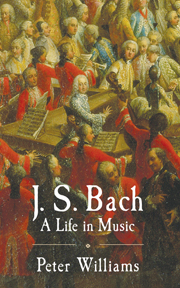Book contents
- Frontmatter
- Contents
- Preface
- Acknowledgments
- Map of Northern Germany in the time of J. S. Bach
- Map of Thuringia and Saxony in the time of J. S. Bach
- 1 Early years 1685–1703
- 2 First appointments 1703–8
- 3 Weimar 1708–17
- 4 Cöthen 1717–23
- 5 Leipzig, the first years
- 6 Leipzig, the middle years
- 7 Leipzig, the final years
- 8 Observations, descriptions, criticisms
- Epilogue
- Postscript
- Glossary
- List of references
- Index of works (BWV)
- Index of names
8 - Observations, descriptions, criticisms
Published online by Cambridge University Press: 10 December 2009
- Frontmatter
- Contents
- Preface
- Acknowledgments
- Map of Northern Germany in the time of J. S. Bach
- Map of Thuringia and Saxony in the time of J. S. Bach
- 1 Early years 1685–1703
- 2 First appointments 1703–8
- 3 Weimar 1708–17
- 4 Cöthen 1717–23
- 5 Leipzig, the first years
- 6 Leipzig, the middle years
- 7 Leipzig, the final years
- 8 Observations, descriptions, criticisms
- Epilogue
- Postscript
- Glossary
- List of references
- Index of works (BWV)
- Index of names
Summary
CIRCUMSTANCES AT THE THOMASKIRCHE
It is a pity that [especially in Leipzig?] he seldom had the luck to find only such performers of his work as would have spared him these irksome comments.
(Obituary)‘These irksome comments’ are the composer's, mentioned in the Obituary by Agricola when he claimed that Bach could discern the smallest error in an ensemble (see below, p. 297). He is contrasting his subject's abilities – unparalleled gifts of hearing, grasp of harmony and melody, seriousness of purpose, technical and creative mastery of keyboards and their music – with the mundane circumstances in which he found himself, and is probably speaking from his own observations made as a student from 1738 to 1741. Here, then, would be another hint that conditions at Leipzig had deteriorated. However, although the authors are unlikely to have known it, already at Weimar Bach's first set of cantatas on promotion in 1714 seems to make heavier musical demands than those that followed: there too he had not quite found what he wanted?
In recent times, one interpretation of a range of evidence has been that the Leipzig cantatas drew on twelve or at most sixteen singers (SATB) and some eighteen instrument-players, with a total number seldom if ever above forty performers even on special occasions, but generally a good deal fewer.
- Type
- Chapter
- Information
- J. S. BachA Life in Music, pp. 270 - 357Publisher: Cambridge University PressPrint publication year: 2007



